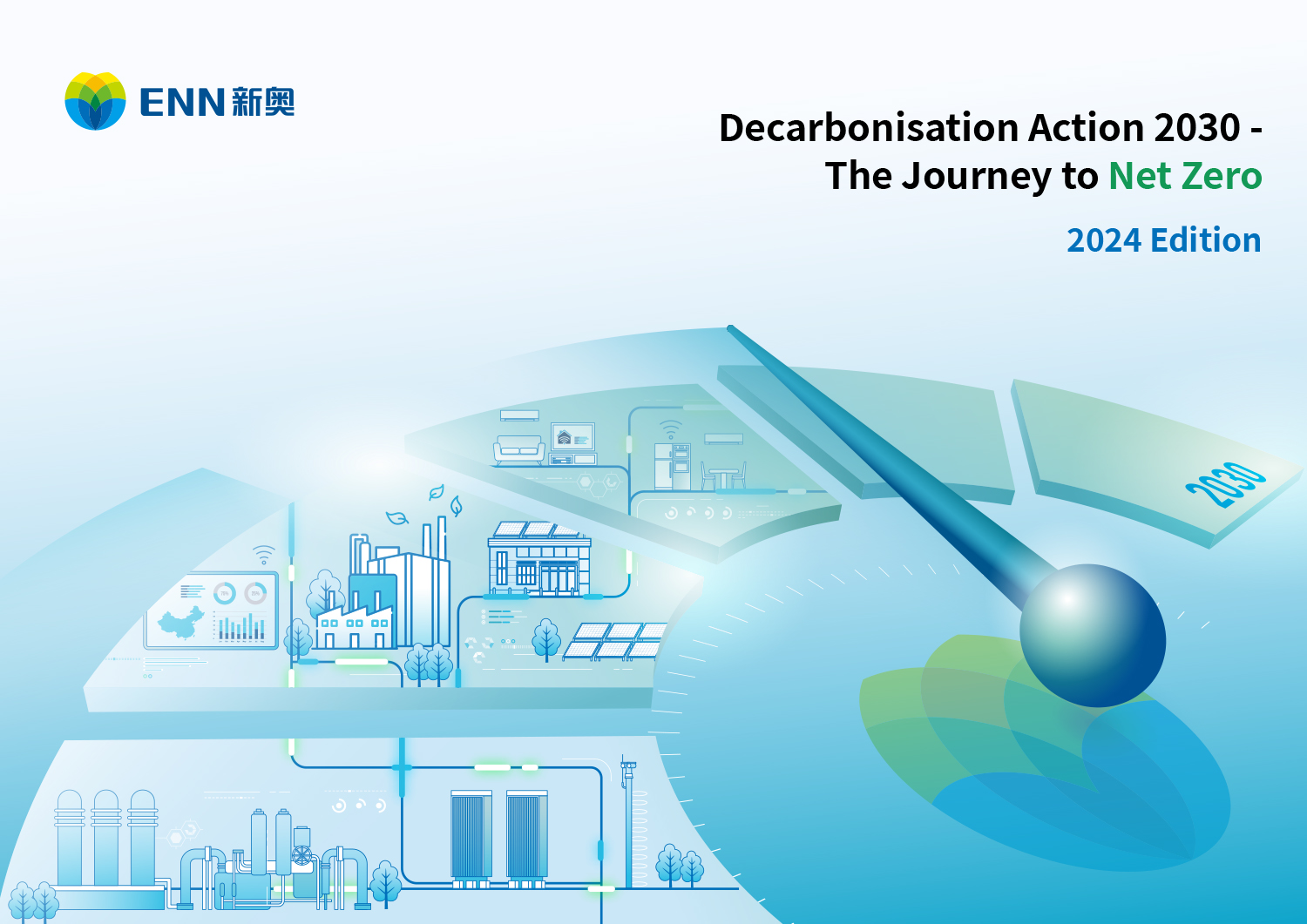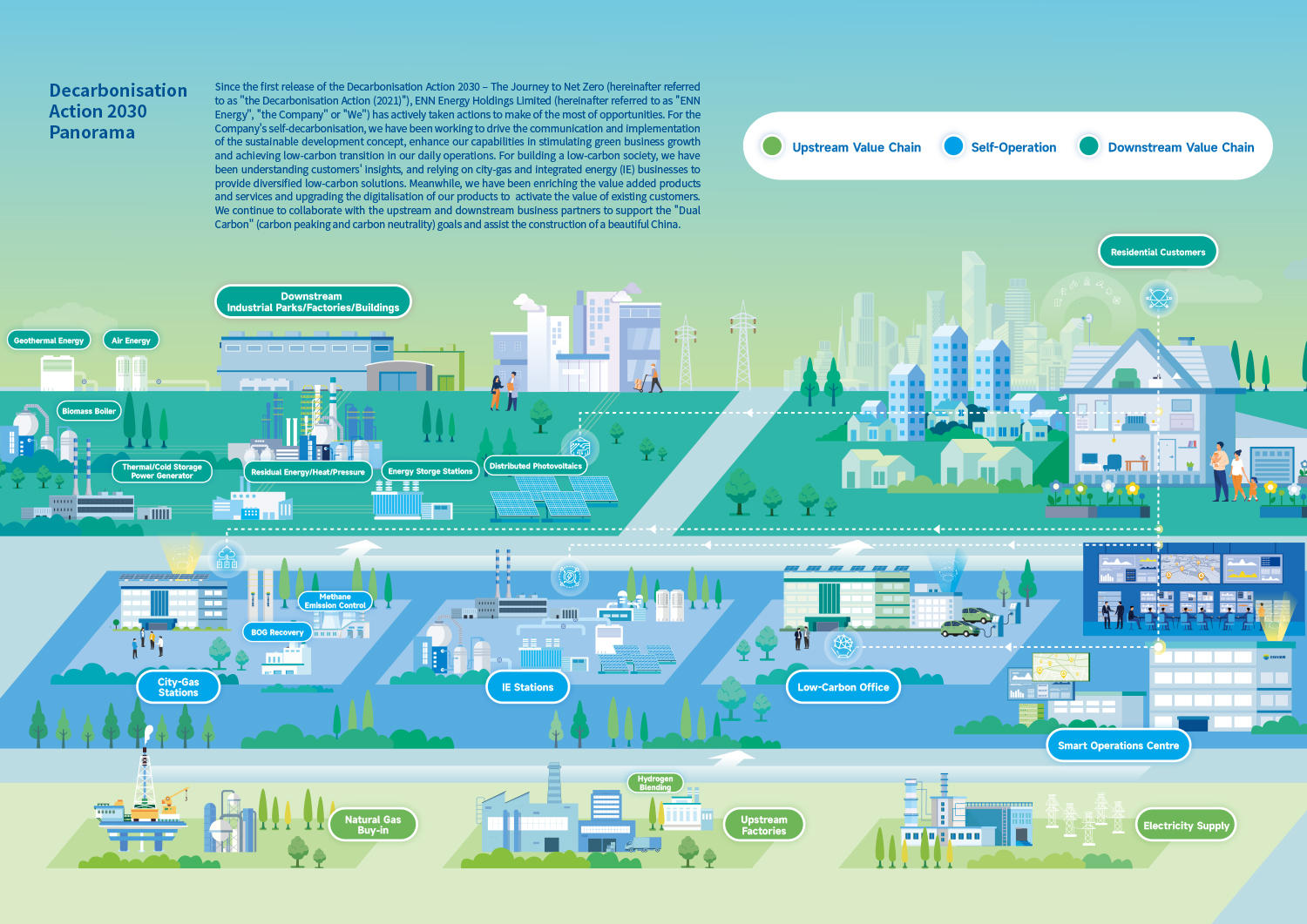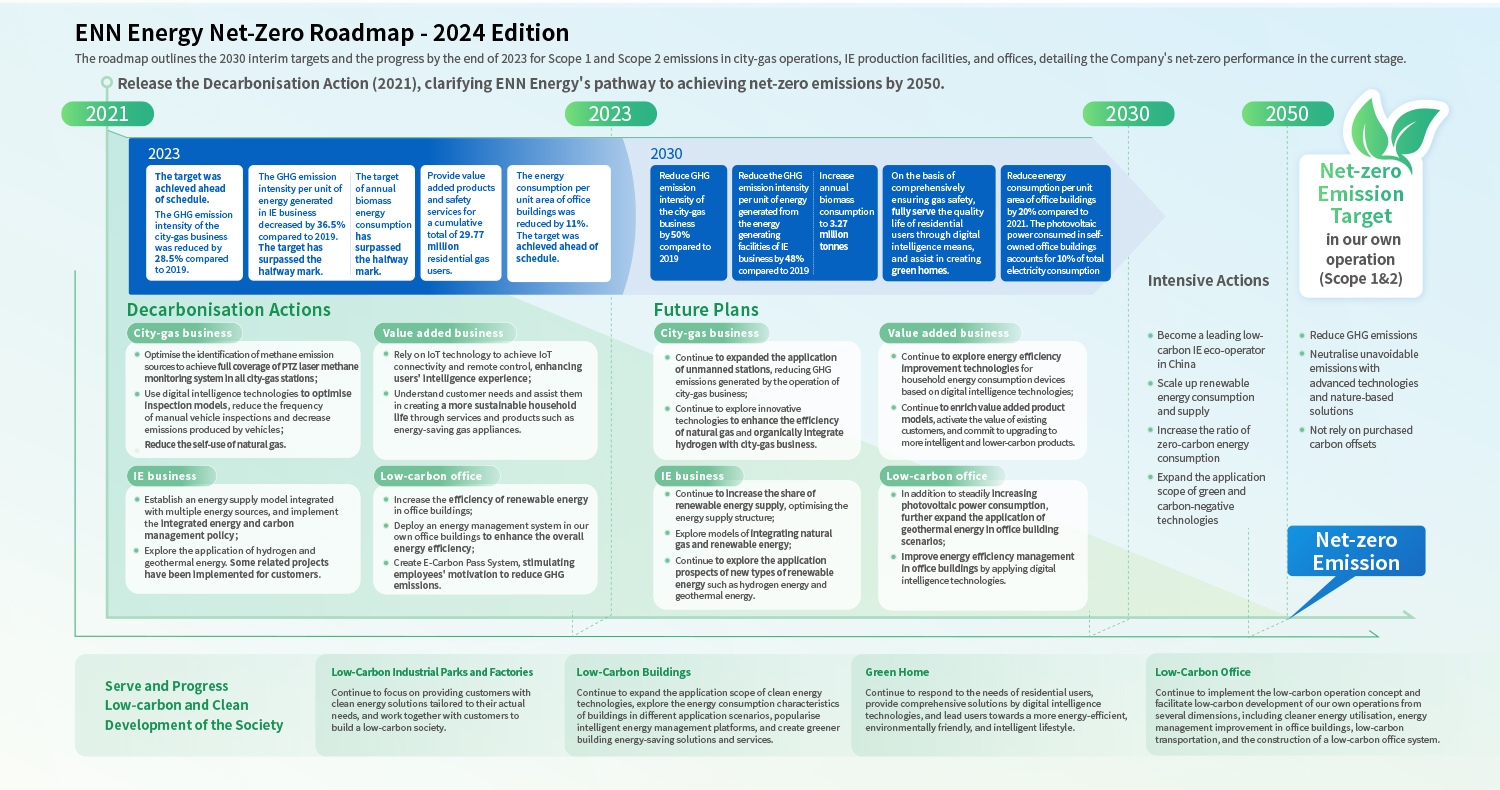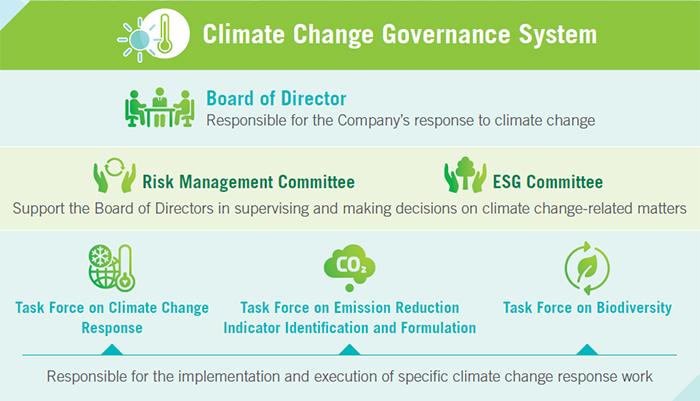|
ESG Report
2017 ESG Report Decarbonisation Action 2030 – The Journey to Net Zero 2024 Edition  ENN Energy first released “Decarbonisation Action 2030 – Journey to Net Zero” in 2021, proposing a long-term goal of achieving net-zero emissions by 2050 without relying on the purchase of green certificates and other offsets. The publication of the 2024 edition of “Decarbonisation Action 2030 – The Journey to Net Zero” (the “Decarbonisation Action 2024”) fulfils the Company’s commitment to reviewing its decarbonisation action plan every three years, examining the progress and achievements, and adjusting key targets to ensure the smooth advancement of its low-carbon transition. Low-carbon transition driven by innovation in four key scenarios: Nature Gas, IE, Value Added Business and Low-Carbon Office As a pioneer in the low-carbon transition, ENN Energy strives to promote the green development of industry and society through continuous innovation of its technology and business model. Based on customers’ actual needs, the Company provides whole-chain, customised energy solutions across four key scenarios: natural gas, IE, value added business and low-carbon office.  ▲ The Panorama of Decarbonisation Action 2030 – 2024 Edition In the Natural Gas scenario, the Company is constantly improving its methane emission control initiatives and exploring innovative technologies to further enhance the energy efficiency of natural gas. Meanwhile, the Company is actively exploring the application prospects of natural-gas-based hydrogen projects. This includes collaborating with customers to build the first hydrogen blending station at a project operation site, achieving the simultaneous development of natural gas and hydrogen. In the IE scenario, the Company is actively advancing the construction of low-carbon factories and industrial parks while providing cleaner energy to facilitate the low-carbon transition in industrial energy use. The Company also leverages its extensive experience in building services management to provide customised building energy-saving solutions. Additionally, the Company is expanding its clean energy solutions with a focus on photovoltaics and biomass energy. This includes customising a distributed photovoltaic and storage project, as well as introducing low-carbon business models such as direct combustion of biomass for energy supply and biomass conversion to biogas. In the Value Added Business scenario, the Company leverages digital technologies to intelligently upgrade basic gas services and actively promotes energy-saving gas appliances to help residential users improve their energy use efficiency. In the Low-Carbon Office scenario, the Company implements a low-carbon operation across four dimensions, including cleaner energy utilisation, optimised energy management in office buildings, low-carbon transportation, and the construction of a low-carbon office system. Smooth progress on low-carbon transition targets, with several targets achieved ahead of schedule Over the past three years, the targets set in the Decarbonisation Action 2021 progressed smoothly, with some targets being achieved ahead of schedule. By the end of 2023, ENN Energy made significant strides in reducing greenhouse gas (GHG) emissions and optimising its energy structure, including:
Updates to net-zero roadmap and low-carbon transition targets Based on its business operations, ENN Energy references leading domestic and international low-carbon transition standards and frameworks to set environmental and corporate low-carbon transition targets, while outlining a clear net-zero roadmap that provides guidance for its energy conservation and emission reduction efforts.  ▲ ENN Energy’s Net-Zero Roadmap – 2024 Edition Since some targets have been achieved ahead of schedule in Decarbonisation Action 2021, the Company has set more ambitious new targets, demonstrating its determination to advance on the path to low-carbon transition. Meanwhile, the Company will optimise the emission reduction measures in various business scenarios to ensure the achievement of its long-term goals. These measures include:
Through the release of the Decarbonisation Action 2024, ENN Energy reaffirms its mission to “achieve the coordinated development of its own carbon reduction and the green upgrading of business, contributing to high-quality social development”. Moving forward, the Company will further integrate sustainability into its business practices and deeply explore market demands for green energy consumption driven by customer needs. By leveraging technology, it will continuously innovate products and services to promote intelligent upgrades in the industry. The Company will work hand in hand with upstream and downstream partners to support the realisation of China’s “Dual Carbon” goals. |
|
Climate-Related Financial Disclosure Report In December 2023, ENN Energy released its first climate-related financial disclosure report. This report aims to demonstrate the Company's attention to climate change issues and its determination to actively address climate-related risks and seize climate-related opportunities, in response to the requirements and expectations of regulators, the capital markets, and stakeholders for climate-related financial disclosure. In this released climate-related financial disclosure report, ENN Energy provided a detailed overview of the impact of its Governance, Strategy, Risk Management, and Metrics and Targets on the Company's operations and business model by referring to the Task Force on Climate-Related Financial Disclosures (TCFD) framework. Governance  Strategy  Risk Management ENN Energy has identified nine types of risks: policy and price; compliance; operation; reputation; legal; health, safety and environment (HSE); market; finance; and climate change. Among these, climate-related risks, which might have significant impacts on the Company's business scope, has been integrated into the overall risk management process of ENN Energy. In 2023, ENN Energy identified a total of 40 climate-related risks and opportunities, including 10 physical risks, 14 transition risks, and 16 opportunities. Based on this identification, each risk was deeply considered and scored in terms of likelihood and severity through expert assessment and workshops with ENN Energy. A shortlist of most crucial climate-related risks and opportunities was then developed based on their possibility and materiality to the Company, of which comprising five risks and two opportunities. An in-depth financial quantitative assessment (Value-at-Stake analysis, VaS) was conducted for the shortlisted risks and opportunities. Future Outlook Looking forward to the future, ENN Energy will continuously enhance its capabilities in climate governance, and follow the trend of the times, and seize the huge opportunities arising from the energy transition to provide our customers with clean and low-carbon energy, work with upstream and downstream partners to contribute to achieve China's "dual carbon" goal. ENN Energy will respond to climate-related risks in a highly strategic and forward-looking manner. The Company will actively seek green innovative solutions, continue to implement decarbonisation actions and explore new areas of business growth opportunities, and continuously monitor and manage climate-related risks to prevent the potential financial impact of climate change and the negative impact on business operations promptly. ENN Energy will also seize the market opportunities arising from the low-carbon transition. ENN Energy will shoulder the mission of energy companies in response to the global climate challenge and work together with stakeholders to build a low-carbon, green, and sustainable future for the earth and humanity. |
|
Biodiversity Conservation ENN Energy is responding to the national biodiversity conservation strategy and adhering to the sustainable development. It has clarified the medium- and long-term decarbonisation action goals, and integrated biodiversity conservation concepts and measures into corporate strategies and daily operations. On May 22, 2022, the 29th International Day for Biodiversity Conservation, ENN Energy released its first Biodiversity Conservation Report , which systematically discloses the Company's practices and achievements in terms of biodiversity conservation. The report disclosed measures taken by the Company for protecting the ecology through five dimensions, land use change, climate change, pollution, overexploitation and species invasion. Green Finance The ENN Energy Holdings Limited ("ENN Energy") has established a Green Finance Framework ("Framework") that sets out how it proposes to use the amount equal to net proceeds to finance or refinance on green projects that in line with the Company development strategy, so as to support the Company to achieve long-term sustainable development. Since 2024, ENN Energy has developed its Green Finance Framework (April 2025 Edition) (Hereinafter referred to as the "Framework" or the "New Version") with reference to the "2021 Green Bond Principles" published by the International Capital Market Association (ICMA), as well as the "2023 Green Loan Principles" jointly issued by the Asia Pacific Loan Market Association (APLMA) and the Loan Syndications & Trading Association (LSTA). The new version of the framework has received a second party opinion (SPO) from S&P Global, with a “dark green” certification rating, to support ENN Energy's long-term sustainable development strategy. The New Version has been revised and updated on the basis of the Green Finance Framework (hereinafter referred to as the "Old Version") initially issued in May 2020. The New Version was officially published online in April 2025 and the SPO was made available to investors on ENN Energy's official website. In addition, ENN Energy issued its first Green Bond Report and obtained third-party certification in 2025, further strengthening our management of key green industry projects. |